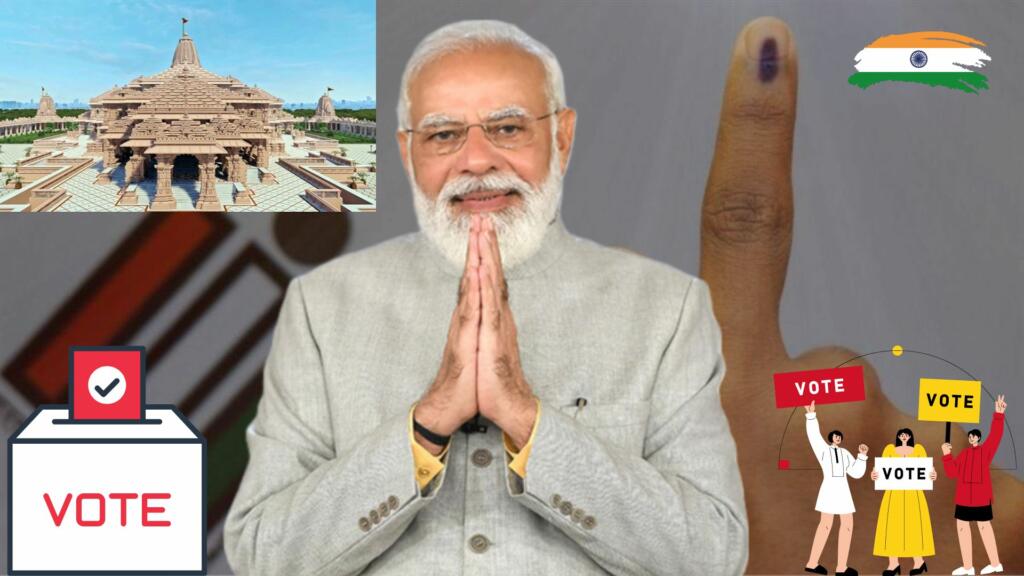In the dynamic realm of Indian politics, speculation abounds as whispers circulate about a potential shift in the Election Commission of India’s schedule, with the Lok Sabha elections possibly announced in February rather than the customary March timeframe. This has ignited discussions about early transformations in the political landscape, particularly with the Bharatiya Janata Party (BJP) making strategic moves in anticipation of the impending electoral battle. Notably, the BJP’s proactive approach includes the potential early announcement of candidates and aligning election dates with significant events, such as the ‘Pran Pratishtha’ of Ram in Ayodhya. As the political chessboard unfolds, the article explores the nuanced strategies, electoral considerations, and the pivotal role of the Ram Temple issue, offering a glimpse into the charged and dynamic electoral season on the horizon.
As the political chessboard begins to unfold, one notable move on the BJP’s part is the potential announcement of its candidates in February. This early declaration is seen as a strategic maneuver, signaling the party’s intent to establish a formidable presence well in advance of the elections. The BJP’s proactive stance has set the stage for a dynamic and charged electoral season.
Additionally, there is contemplation within political circles about the synchronization of Assembly elections in certain states like Haryana and Maharashtra with the Lok Sabha elections. The idea behind this alignment is to streamline the electoral process and create a cohesive voting atmosphere, potentially influencing voter turnout and engagement in these critical states.
Drawing from the precedent set in the 2019 Lok Sabha elections, which were conducted in seven phases, there is widespread anticipation that the upcoming elections may follow a similar pattern. This strategic division of the electoral process aims to ensure thorough coverage across the diverse regions of the country.
One pivotal factor influencing the BJP’s electoral strategy is the Ram Temple campaign. With the ‘Pran Pratishtha’ of Ram in Ayodhya scheduled for January 22, BJP strategists are meticulously planning election dates to synergize with this significant event. The consecration ceremony holds deep symbolic value for the party, and it is poised to be a focal point of their electoral narrative.
The BJP’s affiliates, including the Vishwa Hindu Parishad, Rashtriya Swayamsevak Sangh, and Bajrang Dal, are actively engaged in creating a positive atmosphere around the Ram Temple issue. This concerted effort aims to resonate with the sentiments of the majority Hindu population and further solidify the BJP’s position as the torchbearer of their aspirations.
Also Read: Hindus Worldwide Patiently Await the Consecration of the Ram Mandir
Prime Minister Narendra Modi, a key figure in the BJP’s electoral machinery, has been at the forefront, announcing a series of programs for the year. These initiatives not only serve as governance measures but also contribute to the BJP’s campaign momentum. The strategic rollout of these programs aligns with the party’s vision and provides a platform for PM Modi to connect with the electorate.
In the unfolding political drama, the Congress has chosen to distance itself from the consecration ceremony of the Ram Temple. This move sets the Congress apart from the BJP’s narrative, emphasizing their divergent ideologies. While the BJP leverages the Ram Temple issue to consolidate its support base, other political parties remain uncertain about attending the event, navigating the delicate balance between secularism and cultural identity.
The consecration of the Ram Temple on January 22 is poised to mark the symbolic initiation of the BJP’s campaign for the Lok Sabha elections. Prime Minister Modi’s anticipated speech during this event is expected to convey key messages that will reverberate throughout the political landscape. The Ram Temple issue, deeply embedded in the socio-cultural fabric of India, is set to take center stage in the BJP’s electoral playbook.
The significance of the Ram Mandir issue for the BJP extends beyond regional boundaries, with plans to raise it vigorously in both North and South India. The party’s ambitious target of “400 paar” (over 400 Lok Sabha seats) indicates their confidence in leveraging the Ram Temple narrative to unite Hindus across caste lines. This calculated approach aims to resonate with a broad spectrum of voters, emphasizing a common cultural thread that transcends regional and social divisions.
As February looms on the political horizon, the stage is set for a riveting electoral spectacle. The interplay of strategic announcements, alignment of elections, and the prominence of the Ram Temple issue underscores the intricate dance of political forces. As the nation braces for a potential early electoral showdown, the echoes of political maneuvers and ideological narratives are poised to shape the contours of India’s democratic landscape in the coming months.
Also Watch:
